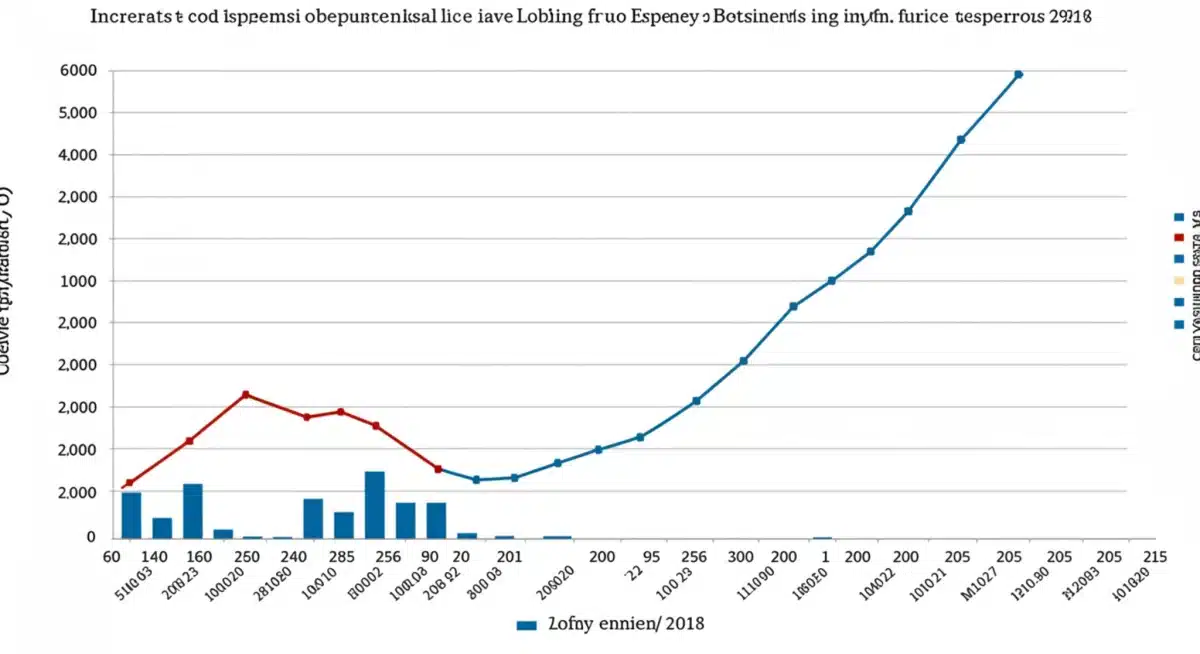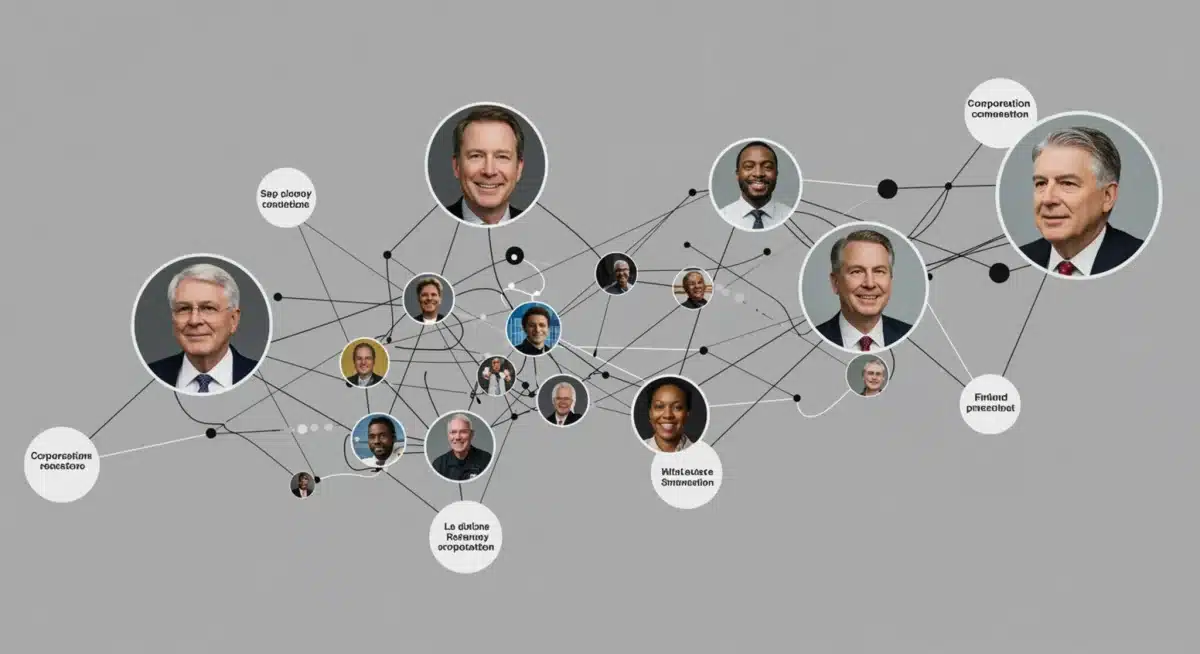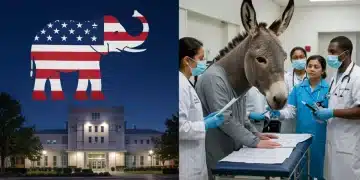Lobbying Spending & Congressional Votes: An In-depth Analysis

The impact of lobbying spending on recent congressional votes significantly shapes legislative outcomes, influencing policy direction and raising questions about democratic representation and transparency.
Have you ever wondered how significant financial contributions truly influence the legislative process in Washington? We delve into lobbying spending impact on recent congressional votes, examining the intricate dynamics between money, power, and policy in the United States.
Understanding the Mechanics of Lobbying Influence
Lobbying is a fundamental aspect of the American political landscape, allowing various organizations and individuals to advocate for their interests directly to lawmakers. This section explores the basic mechanics of how lobbying operates and the sheer scale of financial resources deployed to influence policy decisions. It’s more than just donations; it’s a strategic effort to shape the legislative agenda.
The core function of lobbying is to provide information and perspectives to legislators, often on complex issues that require specialized knowledge. While proponents argue this is vital for informed policymaking, critics point to the potential for undue influence when vast sums of money are involved. The sheer volume of spending often correlates with the resources available to particular industries or advocacy groups.
Key Players and Their Strategies
Numerous entities engage in lobbying, from corporations and trade associations to labor unions and non-profit organizations. Each employs distinct strategies tailored to their objectives, though all ultimately aim to sway legislative outcomes. Understanding who is spending what and why is crucial to grasping the overall impact.
- Corporate Lobbying: Large corporations often invest heavily to protect their market interests, influence regulations, or secure favorable tax treatments.
- Trade Associations: These groups represent entire industries, lobbying on behalf of their members to promote collective interests and fend off adverse legislation.
- Special Interest Groups: Advocacy groups, whether environmental, social, or ideological, use lobbying to advance specific causes and influence public policy.
- Foreign Governments: International entities also engage in lobbying to safeguard their diplomatic and economic interests within the U.S. political system.
These players deploy a range of tactics, from direct meetings with lawmakers and their staff to funding research, organizing grassroots campaigns, and contributing to political campaigns. The ultimate goal is to build relationships and ensure their voice is heard, or ideally, heeded, when critical votes are cast.
The influence of lobbying extends beyond mere financial contributions; it encompasses the provision of expertise, the framing of issues, and the cultivation of long-term relationships with policymakers. This multi-faceted approach makes it challenging to pinpoint a direct causal link between a specific dollar amount and a single vote, yet the cumulative effect is undeniable. The resources dedicated to lobbying reflect the perceived value of influencing policy outcomes, underscoring its strategic importance for many organizations.
Recent Trends in Lobbying Expenditures
The landscape of lobbying spending is dynamic, with expenditures fluctuating based on economic conditions, legislative priorities, and political cycles. Analyzing these trends provides valuable insights into which sectors are investing most heavily and when. Understanding these patterns helps us contextualize the potential influence on congressional decisions.
In recent years, lobbying spending has consistently reached billions of dollars annually, demonstrating its entrenched role in the U.S. political system. Certain industries, such as pharmaceuticals, technology, and finance, frequently top the list of big spenders, reflecting their significant regulatory exposure and economic impact. These trends are not accidental; they are strategic responses to legislative opportunities and threats.

Top Spending Sectors and Their Objectives
A closer look at the sectors that spend the most on lobbying reveals distinct motivations. For instance, the pharmaceutical industry often lobbies to protect intellectual property rights, influence drug pricing regulations, and accelerate drug approval processes. The tech sector, meanwhile, focuses on issues like data privacy, antitrust regulations, and innovation policy. Each dollar spent is a calculated investment.
- Pharmaceuticals/Health Products: Dominant spending aimed at drug pricing, patent protection, and regulatory frameworks.
- Electronics/Telecom: Focus on broadband access, net neutrality, and emerging technology regulations.
- Finance/Insurance/Real Estate: Lobbying on financial regulations, tax policies, and housing market legislation.
- Energy/Natural Resources: Influencing environmental regulations, drilling permits, and renewable energy incentives.
These sectors often face complex regulatory environments and significant government intervention, making lobbying a crucial tool for managing risk and maximizing opportunities. The consistent high spending underscores the perceived return on investment, suggesting that these expenditures yield tangible benefits for the organizations involved. The trends also show a reactive component, with spending spiking in anticipation of major legislative debates.
Observing these trends over time provides a clearer picture of the enduring power dynamics at play. The sustained commitment to lobbying by these sectors highlights the critical role it plays in their business strategies. It also indicates that despite calls for reform, the practice remains a deeply embedded part of how policy is shaped in Washington, with financial resources often dictating the volume and persistence of advocacy.
Case Studies: Direct Links Between Spending and Votes
While establishing a direct, undeniable causal link between specific lobbying expenditures and individual congressional votes can be challenging, numerous case studies offer compelling circumstantial evidence. These instances highlight how well-funded lobbying efforts often precede legislative outcomes favorable to the lobbying entities. This section explores some notable examples that illustrate this complex relationship.
One area frequently cited involves industries facing significant regulatory changes. When new environmental standards or financial regulations are proposed, affected industries often dramatically increase their lobbying spending. This surge in advocacy is typically followed by amendments, delays, or even the defeat of legislation that would have been detrimental to their interests. These patterns suggest a strong correlation, if not always a direct cause.
Examining Specific Legislative Battles
Consider the debates surrounding pharmaceutical pricing. Pharmaceutical companies invest heavily in lobbying, and historically, efforts to introduce stricter price controls have faced significant opposition and often failed to pass. This suggests that the substantial lobbying presence plays a role in shaping the legislative outcomes on these critical issues. The industry’s arguments about research and development costs often resonate with policymakers, reinforced by persistent advocacy.
- Energy Sector Subsidies: Lobbying by fossil fuel interests has often been linked to the continuation of tax breaks and subsidies, even in the face of growing climate change concerns.
- Banking Deregulation: Following periods of financial crisis, calls for stricter regulations are often met with intense lobbying from the banking sector, leading to watered-down reforms or exemptions.
- Tech Antitrust Efforts: As calls for breaking up large tech companies grow, these firms have significantly increased their lobbying budgets to influence policymakers against such measures.
Another compelling example can be found in the defense industry, which consistently spends millions lobbying Congress. This spending often coincides with the approval of large defense contracts and robust military budgets, even in times when such expenditures are questioned by some. The complex relationships between defense contractors, former military personnel in lobbying roles, and congressional committees create a powerful feedback loop.
These case studies, while not always providing a smoking gun, collectively paint a picture of consistent patterns. They demonstrate that when powerful interests invest heavily in lobbying, the legislative process often yields results that are aligned with those interests. This observation fuels ongoing debates about the fairness and integrity of the democratic process, particularly when public opinion diverges from legislative outcomes.
The Role of Transparency and Disclosure in Lobbying
Transparency and disclosure are critical components in understanding the true impact of lobbying spending. Without clear reporting mechanisms, it would be nearly impossible to track who is spending what and on which issues. This section examines the current regulatory framework for lobbying disclosure and its effectiveness in shedding light on the influence industry.
The Lobbying Disclosure Act (LDA) of 1995, along with subsequent amendments, mandates that lobbyists and lobbying firms register with Congress and periodically report their activities, including expenditures and the specific issues they are working on. This information is publicly available, allowing researchers, journalists, and citizens to monitor lobbying efforts. However, the effectiveness of these disclosure laws is a subject of ongoing debate.

Challenges and Loopholes in Current Regulations
Despite existing regulations, several challenges and potential loopholes can obscure the full extent of lobbying influence. One common criticism is that the definition of a “lobbyist” can be narrow, potentially allowing individuals or organizations to engage in influence activities without formally registering. This can create a “dark money” aspect to lobbying, where spending is less transparent.
- “Shadow Lobbying”: Activities that influence policy but fall outside the strict definition of lobbying, thus avoiding disclosure requirements.
- Bundling Contributions: While campaign finance laws govern donations, the aggregated impact of bundled contributions can obscure individual donor influence.
- Revolving Door Phenomenon: Former government officials transitioning into lobbying roles can leverage their connections and knowledge, raising ethical concerns.
- Grassroots Lobbying Ambiguity: Efforts to mobilize public opinion can be hard to track as direct lobbying, even if funded by special interests.
Another issue is the level of detail required in disclosure reports. While expenditures are reported, it can be difficult to tie specific amounts to particular legislative outcomes or understand the full scope of a lobbyist’s activities. The reports often provide broad categories rather than granular details, making it challenging to conduct precise analyses of influence.
The revolving door between government service and lobbying also presents a transparency challenge. Former members of Congress or high-ranking government officials often become highly sought-after lobbyists due to their intimate knowledge of the legislative process and their extensive networks. While this is legal, it raises questions about potential conflicts of interest and the leveraging of public service for private gain. Efforts to strengthen disclosure laws and address these loopholes are ongoing, driven by advocates for greater accountability in government.
The Impact on Policy Outcomes and Public Interest
The ultimate concern regarding lobbying spending is its impact on policy outcomes and whether these outcomes truly serve the broader public interest. When well-funded special interests can disproportionately influence legislation, there is a risk that policies may favor narrow corporate or group agendas over the needs of the general population. This section explores these critical implications.
One of the most significant impacts is the potential for regulatory capture, where regulatory agencies, ostensibly created to act in the public interest, end up serving the commercial or political interests of the industries they are supposed to regulate. This can lead to weaker regulations, preferential treatment, and reduced oversight, all of which can have significant long-term consequences for society.
Distortion of Legislative Priorities
Lobbying can also distort legislative priorities, pushing issues that are important to wealthy donors or powerful corporations to the forefront, while less well-funded but equally critical issues are sidelined. This can lead to an imbalance in the legislative agenda, where resources and attention are not allocated based on societal need but rather on the ability to lobby effectively.
- Environmental Policy: Lobbying by industries can lead to less stringent environmental protections, impacting public health and ecological sustainability.
- Healthcare Reform: Intense lobbying by pharmaceutical and insurance companies often influences the scope and effectiveness of healthcare legislation, sometimes to the detriment of broader access or affordability.
- Taxation: Corporate lobbying frequently results in tax codes that favor specific industries or wealthy individuals, shifting the tax burden elsewhere.
- Consumer Protection: Efforts to strengthen consumer protections can be undermined by lobbying from industries seeking to avoid increased regulatory burdens.
The cumulative effect of this influence can be a legislative environment where policy decisions are made behind closed doors, with limited input from the broader public. This can erode public trust in government and foster a sense that the political system is rigged in favor of powerful elites. The perception that money buys influence is a significant challenge to democratic legitimacy.
Ultimately, the debate around lobbying spending is a debate about the integrity of democratic processes. While advocacy is a legitimate part of a free society, the role of vast financial resources in shaping legislation raises fundamental questions about equitable representation and the pursuit of the common good. Addressing these concerns requires a continuous effort to enhance transparency, strengthen ethical guidelines, and ensure that all voices have a fair opportunity to be heard, not just the loudest or wealthiest.
Reforms and Potential Solutions for Lobbying Oversight
Given the persistent concerns about the influence of lobbying spending, various reforms and potential solutions have been proposed to enhance oversight and ensure a more equitable legislative process. These proposals range from stricter disclosure requirements to campaign finance reforms and ethical guidelines for former government officials. The goal is to mitigate undue influence while preserving the right to petition the government.
One common suggestion is to broaden the definition of lobbying activities to capture more influence peddling that currently falls outside official disclosure mandates. This would bring more “shadow lobbying” into the light, allowing for greater public scrutiny. Additionally, increasing the frequency and detail of disclosure reports could provide a more real-time and comprehensive picture of lobbying efforts.
Proposed Legislative and Ethical Changes
Beyond disclosure, many advocates call for more significant campaign finance reforms to reduce the reliance of politicians on large contributions, which are often linked to lobbying efforts. Limiting the size of individual and corporate contributions, or exploring public financing options, could help level the playing field and reduce the incentive for special interests to spend lavishly on lobbying.
- Enhanced Disclosure: Mandating more granular reporting of lobbying activities, including specific meetings and legislative texts influenced.
- “Revolving Door” Restrictions: Lengthening the cooling-off period before former officials can lobby their previous agencies or colleagues.
- Campaign Finance Reform: Implementing stricter limits on contributions and exploring public financing models to reduce dependence on private money.
- Independent Oversight Bodies: Establishing or empowering independent bodies to monitor lobbying activities and enforce ethical standards.
Ethical guidelines for former government officials entering the lobbying sector are also a key area for reform. Lengthening the “cooling-off period” before former members of Congress or senior staff can lobby their previous colleagues could help prevent the immediate leveraging of insider knowledge and relationships for private gain. This aims to ensure that public service is not merely a stepping stone to lucrative lobbying careers.
Ultimately, any effective solution will likely involve a multi-pronged approach that combines legislative reforms with a commitment to stronger ethical standards and increased public awareness. The challenge lies in balancing the constitutional right to petition the government with the imperative to safeguard democratic integrity from the corrosive effects of unlimited financial influence. Continuous vigilance and adaptation of regulations are necessary to keep pace with evolving lobbying tactics.
The Future of Lobbying and Congressional Accountability
The landscape of lobbying is constantly evolving, driven by technological advancements, shifting political dynamics, and ongoing debates about money in politics. Predicting the future of lobbying and its impact on congressional accountability requires considering these multifaceted forces. As information becomes more accessible, so too does the scrutiny on how influence is wielded in Washington.
Digital lobbying, for instance, has gained prominence, utilizing online platforms, social media, and data analytics to mobilize grassroots support and target specific policymakers. This approach can be both more cost-effective and harder to track than traditional lobbying, posing new challenges for transparency and oversight. The ability to quickly organize and amplify messages online adds another layer of complexity to the influence game.
Emerging Trends and Persistent Challenges
The increasing polarization of American politics also plays a role, as lobbying efforts often align with existing partisan divides, reinforcing ideological positions rather than fostering bipartisan consensus. This can make legislative compromise more difficult, as interest groups push their favored outcomes with intense focus, often at the expense of broader, more moderate solutions.
- Digital Advocacy: The rise of online platforms and data analytics for targeted lobbying and grassroots mobilization.
- Polarization Reinforcement: Lobbying efforts often exacerbate partisan divides, making legislative compromise harder.
- Ethical Scrutiny: Increased public and media attention on ethical lapses and conflicts of interest in lobbying.
- Global Influence: The growing complexity of international relations means foreign entities continue to be significant players in U.S. lobbying.
Despite calls for reform, the fundamental role of lobbying in a representative democracy is unlikely to disappear. The challenge for congressional accountability will be to adapt to these evolving tactics, ensuring that the legislative process remains responsive to the needs of all citizens, not just those with the deepest pockets. This requires a continuous commitment to transparency, ethical governance, and robust public engagement.
The future may see a greater emphasis on independent oversight and enforcement, alongside technological solutions that improve the accessibility and utility of lobbying data. Ultimately, maintaining public trust in the legislative process hinges on demonstrating that policy decisions are made based on merit and public good, rather than on the sway of financial influence. This ongoing struggle for balance will define the future of lobbying and accountability in Congress.
| Key Aspect | Brief Description |
|---|---|
| Lobbying Mechanics | How organizations influence lawmakers through advocacy and financial resources. |
| Spending Trends | Billions spent annually, with pharmaceuticals, tech, and finance leading the way. |
| Policy Impact | Potential for regulatory capture and distortion of legislative priorities. |
| Reform Efforts | Proposals for enhanced disclosure, campaign finance, and ethical guidelines. |
Frequently Asked Questions About Lobbying’s Impact
Lobbying is the act of attempting to influence decisions made by officials in government. It is legal and protected under the First Amendment of the U.S. Constitution, which guarantees the right to petition the government for a redress of grievances. Organizations use it to advocate for their interests.
Lobbying spending in the United States consistently reaches several billion dollars annually. For example, in recent years, figures have often exceeded $3 billion, with specific industries like pharmaceuticals and technology being among the highest spenders, reflecting their vested interests in policy outcomes.
While direct causal links between specific lobbying expenditures and individual votes are hard to prove, extensive research and case studies suggest a strong correlation. Well-funded lobbying efforts often precede legislative outcomes favorable to the lobbying entities, influencing the legislative agenda and policy details.
Key criticisms include the potential for undue influence by wealthy special interests, leading to policies that favor narrow agendas over the public good. Concerns also arise regarding regulatory capture, distortion of legislative priorities, and the “revolving door” phenomenon where former officials become lobbyists, leveraging insider access.
Proposed reforms include enhancing transparency and disclosure requirements for lobbying activities, strengthening campaign finance laws to reduce reliance on large donations, and implementing stricter ethical guidelines for former government officials transitioning into lobbying roles. These aim to ensure greater accountability and fairness.
Conclusion
The intricate relationship between lobbying spending and congressional votes remains a cornerstone of American politics, a dynamic interplay of advocacy, financial resources, and policy outcomes. While legal and constitutionally protected, the scale of expenditures and the potential for disproportionate influence warrant continuous scrutiny. Understanding its mechanics, trends, and impacts is crucial for an informed citizenry and for upholding democratic integrity. As the political landscape evolves, so too must the frameworks governing lobbying, ensuring that the voice of every citizen, not just the well-funded few, genuinely shapes the nation’s laws and future.





